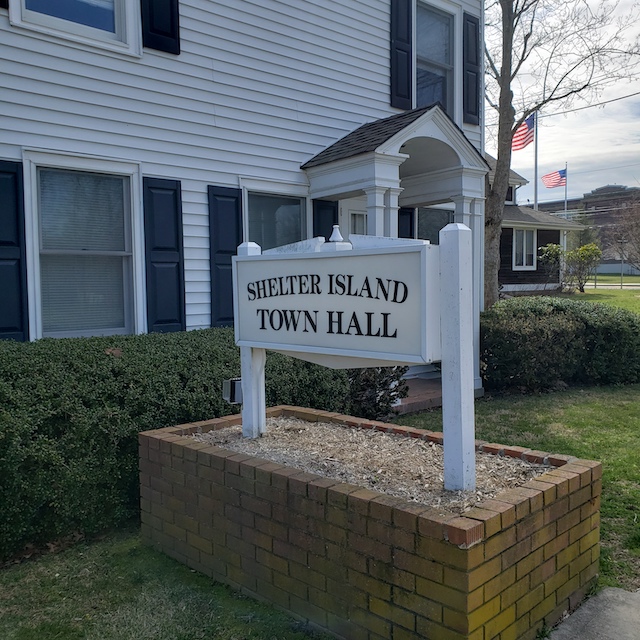The Town Board has announced it will spend Community Preservation Fund money, as permitted under state and local law, to study and possibly implement a Transfer of Development Rights (TDR) program.
CPF Chair Gordon Gooding said he was surprised by the decision, but officials reminded him he’d been informed a week earlier and had raised no objections.
The board agreed at its Tuesday meeting to hire P.W. Grosser Consulting Inc. of Bohemia to explore the viability of creating a TDR program here to be used exclusively in connection with Community Housing.
Town Attorney Stephen F. Kiely said the Town Board has been derelict in its duty to explore TDR, which it has long been required to do by state statute enabling the Community Preservation Fund.
An investigation of the planning tool — pioneered as a means across Suffolk County to preserve land in designated areas and transfer certain development rights to other designated areas — is required under the Peconic Region Community Preservation Fund Act, he said.
The state legislation also allows Town Boards, at their sole discretion, to use CPF funds to establish TDR programs, Kiely said.
The first step is to examine whether TDR is suitable for Shelter Island. It may be that past Town Boards dismissed the idea out of hand, given the limited public water and sewer systems on the Island. However, evolving technology for wastewater treatment and water delivery systems may mean TDR is a viable tool to support Community Housing on Shelter Island.
To determine suitability, the consulting firm will first prepare a Generic Environmental Impact Statement (GEIS), and if the study indicates TDR may be useful for Community Housing here, the firm will then proceed to draft a program. The program must adhere to strict regulations and identify areas that are suitable for preservation via TDR (sending districts) due to environmental, open space, and other concerns, and those where Community Housing development is more suitable (receiving districts).
The process is expected to take months, with numerous opportunities for public input and education. [Read more in our post “KIely says TDRs could take months to enact”]
The total cost is estimated at $100,000, but Deputy Supervisor Amber Brach-Williams noted the process might not go further than the GEIS, in which case the Town would incur only costs associated with the study.
CPF chair claims surprise
Gooding initially claimed at Tuesday’s work session that he was surprised to find that his committee had been left out of decision-making.
But in an exchange late in the Town Board’s Tuesday evening meeting, members reminded Gooding that he’d been notified on August 9 of their intentions. They also asked that he accept an apology for miscommunication from Councilwoman BJ Ianfolla, a Town Board liaison to the CPF committee.
Instead, Gooding rebuffed Ianfolla’s apology and mischaracterized the Town Board’s position on TDR, saying Kiely and Ianfolla have told him “we don’t need TDRs for affordable housing.”
Kiely corrected him, saying TDR is one tool among many. While they’re not required for Community Housing, “you would have a more effective Community Housing program by utilizing TDRs,” Kiely said.
He noted that Gooding was missing an essential point, which is that the CPF enabling statute requires the Town Board to investigate TDR.
Here’s what the law says
Here’s what the state law says about TDR:
- Section 6-S.7 — The governing body of any designated community which has established a community preservation fund pursuant to this section shall study and consider establishing a transfer of development rights program to protect community character as provided for by section 261a* of the town law. All provisions of such section 261a shall be complied with.
(*Section 261a of NYS Town Law outlines Transfer of Development Rights definitions, conditions, and procedures.)
Shelter Island Town Code, which derives from the state CPF legislation, enumerates the Community Preservation Fund uses (underline added for emphasis):
- Section 6-5.3 — The purposes of the fund shall be exclusively,
- a) to implement a plan for the preservation of community character as required by § 64-e, Subdivision 6, of the Town Law
- b) to acquire interests or rights in real property for the preservation of community within the Town, including any village, in accordance with said plan
- c) to establish a bank pursuant to a transfer of development rights program consistent with § 261-a of the Town Law, at the sole discretion of the Town Board.
- d) to provide a management and stewardship program for such rights and interests acquired by the fund, consistent with this article and in accordance with said plan.
CPF Advisory Board member Cathy Kenny told the Town Board that she interpreted the language to mean only that the Town Board could fund a TDR bank using CPF revenues. Kiely disagreed, saying it was his opinion that the Town Board could use CPF revenues to engage a consultant as part of determining whether a TDR program will even work here on Shelter Island.
A Town Board decision
Kiely told Gooding that while the CPF Advisory Board does great work, “your mandate is to review and make recommendations on proposed acquisitions of interest in real property.”
“Exploring a TDR program has nothing to do with your committee,” he said. “That’s a Town Board decision that they’re compelled to do.”
What’s more, Kiely said, Town Board members shouldn’t expect taxpayers to foot the bill for a TDR study. “It would be, in my mind, a breach of their fiduciary duty if they did not use the CPF monies.”
Gooding challenged Kiely, suggesting that just because there is a law “doesn’t mean it’s the correct thing to do.”
But Kiely countered that the Town Board must at least study TDR, regardless of anyone’s opinion.
Councilwoman Meg Larsen responds
In a follow-up letter late Wednesday, Councilwoman Meg Larsen called out Gooding for what she deemed manipulative behavior and creating “a spectacle.”
The CPF expense was “clearly communicated to you, you agreed that the statute allowed for it, and you did not voice objection,” Larsen said in a letter she shared with local media.
“You then chose not to share it with your committee. You instead orchestrated a scenario in which you painted the board as nefarious and intentionally miscommunicative.”
Larsen said the Town Board was working to clean up CPF processes that in the past led to “flawed” acquisitions.
“By blaming your lack of communication as the head of your committee on BJ, you attempted to once again undermine and discredit the [Town] Board in a fashion that I find unacceptable.”
Going forward, Larsen said, she’ll insist that two CPF members attend Town Board executive sessions where negotiations are being discussed “to ensure clear communication between the Town Board and the CPF committee.”





